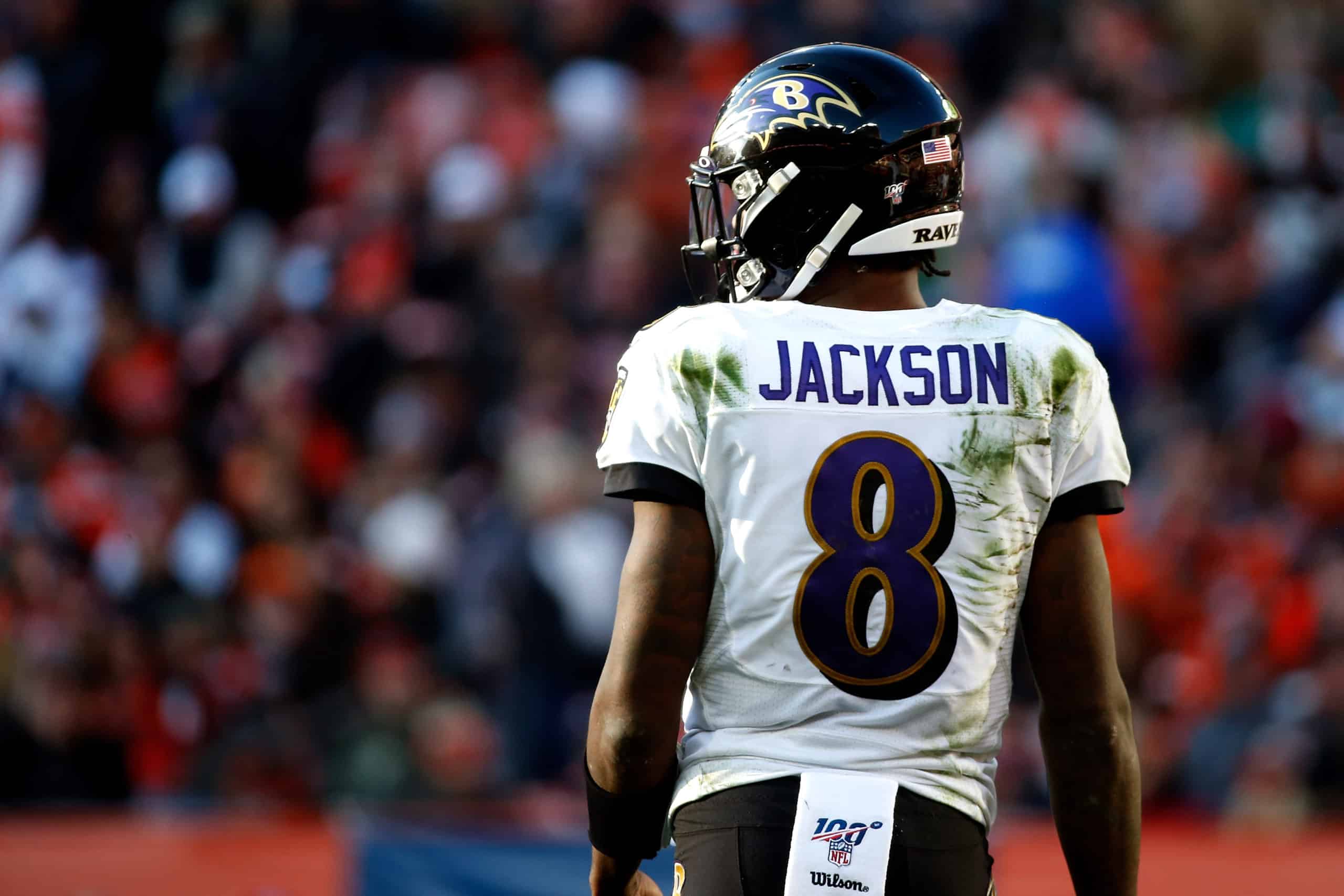The 2019 NFL regular season has concluded. While we could dive into a week of wacky games that both didn’t matter at all and mattered a whole lot, 1st and 10 this week will give an expanded look at the year-end awards, both real and made up, to wrap up our look at the regular season before we dive into the playoffs.
1. Most Valuable Player
Winner: Lamar Jackson, Baltimore Ravens
We’ll start with the big one because no award is easier to call than this one. Starting with a 324-yard, five-touchdown performance in Week 1, Lamar Jackson took the league by storm and didn’t stop. Jackson had big game after big game, whether it was through the air or on the ground. Jackson finished the year fourth in Adjusted Yards per attempt and entered Week 17 (he did not play in the season’s final week) first by Expected Points Added both passing and rushing, per Sports Info Solutions.
Jackson’s rushing wasn’t just some nice complement to his game. He was the most dominant runner in the league by a wide margin. He had more than double the rushing EPA of the next best player this season and more than 2.5 times his teammate Mark Ingram who was third.
The rushing ability also shouldn’t take away from what Jackson did as a passer. He led the league in yards per attempt from a clean pocket (8.8 YPA) and trailed only Dak Prescott in EPA. Jackson was also the league’s best at breaking tackles and avoiding hits. He had a sack rate 10% better than the league average, almost unheard of for a mobile quarterback (for comparison, Russell Wilson ran a sack rate 13% below league average).
There was barely a part of the game where Jackson didn’t excel, let alone find somewhere he struggled. Jackson was the focal point of the league’s best offense, No. 1 seed in the AFC, and the Super Bowl favorite. No one added more to his team in 2019 than Lamar Jackson.
2: Offensive Player of the Year
Winner: Michael Thomas, New Orleans Saints
Michael Thomas finished the season with more receptions than all but four other players had targets. Thomas’s 149 receptions set an NFL record and it wasn’t just that he was a high-volume receiver, he was also a high-efficiency receiver.
We wrote about Thomas’s unique skillset and usage back in November and that trend continued. Thomas excelled in the short to intermediate area of the field but what kept him from having the efficiency of a glorified running back is how often he was able to get open and catch the ball. Getting targeted at an average depth of 8.1 yards beyond the line of scrimmage doesn’t work if you’re only catching 65% of passes, but it does if you’re catching 80.5% of those passes and averaging 4.1 yards after the catch per reception.
Thomas easily led the league in receiving EPA, but also in the rate of plays that produced positive EPA, which doesn’t rely on his volume.
The Saints might not have gotten a first-round bye, but they probably don’t make the playoffs with five games of Teddy Bridgewater if Thomas wasn’t the type of receiver he is. Between Bridgewater and Drew Brees, the Saints had to rely on short to intermediate throws and despite the lower than average aDOT, Thomas accounted for 41.3% of New Orleans’s air yards, which was second in the league behind Courtland Sutton.
3: Defensive Player of the Year
Winner: Richard Sherman, San Francisco 49ers
We’ve gone here before and it’s not going to be a popular option — I might be completely on an island with this pick — but I can’t help rewarding the impact Sherman had on one of the best secondaries in the league.
It was only a week and a half ago we looked at Sherman’s 2019 and compared it to those of Stephon Gilmore and Tre’Davious White. Sherman looks even better now after Week 17. White didn’t play and Gilmore was targeted often and effectively against DeVante Parker and the Miami Dolphins. Meanwhile, in a game that decided the NFC West, Sherman’s former team, the Seattle Seahawks, straight up avoided him in coverage.
Only four of Russell Wilson’s passes went outside to the right and those were either dump-offs or passes to tight ends not in Sherman’s coverage. Making plays on the ball is great, but so is forcing a team to eliminate one side of the field from its game plan. Sherman was already among the best in Adjusted Yards allowed per coverage snap and that will only improve after not seeing a target in the final game of the season.
Still, more than any other award this season, there is no wrong answer. Even after Week 17, Gilmore’s season has been incredible. Pittsburgh’s T.J. Watt can make a valid case as can Arizona edge rusher Chandler Jones.
4: Offensive Rookie of the Year
Winner: A.J. Brown, Tennessee Titans
Arguably no receiver did more with what he was given than A.J. Brown. Brown finished the season with a league-leading 8.8 yards after the catch per reception and, per Next Gen Stats, led the league in YAC/R over expectation.
Among wide receivers, Brown was second in receptions per broken tackle behind only teammate Corey Davis, but Brown was able to do much more after he got through contact. Brown’s ability to get open and gain yards after the catch in areas where that isn’t necessarily expected was a big reason for the breakout of Ryan Tannehill. Since Tannehill took over as the starter in Week 7, Brown ranks 12th in receiving EPA.
Brown also had 15 receptions of 20 yards or more, which tied for 22nd in the league. His long touchdowns are memorable, too. He was in a seven-way tie for third-most receiving touchdowns of 20 or more yards (five), which included a 55-yarder in Week 1, a 91-yarder in Week 14, and a 51-yarder on Sunday in Week 17.
5: Defensive Rookie of the Year
Winner: Nick Bosa, San Francisco 49ers
Bosa slowed from his first half of the season pace once the 49ers’ depth along the defensive line started to whittle down but he still remained one of the league’s best pass rushers, let alone rookies. Bosa finished the season tied for eighth with 25 quarterback hits and 22nd with nine sacks.
Jacksonville’s Josh Allen finished just behind Bosa in hits (22) and had more sacks (10.5) with a higher pressure rate in significantly fewer snaps, but we’re going to give Bosa credit for being on the field more often and not just in pass-rush favorable downs. Those injuries along the line have forced Bosa to play almost all of San Francisco’s defensive snaps over the past few weeks and it has allowed opposing offenses to focus more on stopping him without the other threats around him. Still, Bosa has been able to make impactful plays.
He was a force against the run this season, tied for the fifth-most tackles for loss with 16, and showed off speed that allowed him to be in situations other defensive ends wouldn’t be in, like his chase down tackle of a Russell Wilson scramble in the Week 17 matchup.
Bosa isn’t the runaway pick he looked to be early in the season, but he still finished as the best of a truly impressive group of rookie pass rushers this season.
6: Coach of the Year
Winner: John Harbaugh, Baltimore Ravens
No coach embraced the path to winning in the modern NFL more than John Harbaugh during the 2019 season. He allowed for a complete revamp of the offense around a supremely talented quarterback. He gave free rein for a defense that was the league’s most aggressive with a blitz rate over 50%. He, of course, was the league’s most aggressive coach on fourth downs, which allowed both the offense and defense to thrive.
Harbaugh is one of the few “CEO-type” coaches in the league without calling plays on either side of the ball, but he truly excelled in creating the best environment for each side of the ball to succeed while maximizing the effectiveness of his in-game decision making.
7: Assistant Coach of the Year
Winner: Greg Roman, Baltimore Ravens
This award doesn’t officially exist in the NFL but it should and Roman would be the easy choice here to piggyback off Harbaugh. Roman was the perfect choice as offensive coordinator of this Ravens team after serving as the tight ends coach last season. Roman had previously built efficient offenses for mobile quarterbacks in Colin Kaepernick and Tyrod Taylor but he turned it up to 11 with Jackson.
Under Roman, the Ravens set a single-season record for rushing yards but it came as an incredibly efficient rushing offense and not just running for the sake of “establishing” it. It wasn’t just the rushing that was impressive, either. Baltimore was the most efficient passing team in the league with Willie Snead and Seth Roberts as the leading wide receivers in snaps played. Roman set up a creative and effective offense that was the best in the league by a wide margin.
8: Executive of the Year
Winner: Brian Gutekunst, Green Bay Packers
Executive of the Year can be a tricky award. It’s typically given out to the general manager who gets a surprising jump in performance from a team that isn’t likely to be sustained and looks terrible in hindsight as early as a year later.
With that in mind, what Gutekunst did to aggressively reshape the Packers, especially on defense, was incredibly impressive after years of avoidance under Ted Thompson. Free agent signings of Za’Darius Smith and Preston Smith were viewed as pricy by some at the time, but Za’Darius Smith had one of the best defensive performances in the league this season and Preston Smith was also a defensive force. Adrian Amos was also one of the best value signings in free agency and he fortified the back end of the Green Bay defense. In the draft, Rashan Gary was a reach but Darnell Savage was a hit later in the first round.
The Packers couldn’t stop the run but were a borderline top-10 pass defense. With the disappointing play of the quarterback, that defense might be the only way the Packers make a deep run into the playoffs.
9: Play of the Year
Winner: Miami Fake Field Goal
There’s nothing even close to topping Miami’s fake field goal against the Philadelphia Eagles. It was the best play of the season that started an impressive run of games to end the season for the Dolphins.
10. RedZone Channel MVP
Winner: Jameis Winston, Tampa Bay Buccaneers
This could easily go to Lamar Jackson, but since he was the league MVP we’ll go elsewhere. In the process of a 32-touchdown, 30-interception season whenever a Buccaneers update flashed in the corner of the RedZone channel or Scott Hanson flipped to that game, you knew something amazing was going to happen. There was no bigger thrill than seeing what Jameis Winston would do on a given pass in 2019.
















